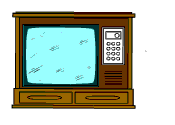 Arbitrary qualities of what we know can be dangerous.
Arbitrary qualities of what we know can be dangerous.  Arbitrary qualities of what we know can be dangerous.
Arbitrary qualities of what we know can be dangerous.
![]()
"My argument is limited to saying that a major new medium changes the structure of discourse… by creating new forms of truth telling."
"I believe the epistemology created by television not only is inferior to a print based epistemology but is dangerous and absurdest."
"The epistemology of new forms such as television does not have an entirely unchallenged influence."
p. 27.
 "They delude themselves who believe that television and print can coexist, for coexistence implies parity. There is no parity here.
"They delude themselves who believe that television and print can coexist, for coexistence implies parity. There is no parity here.
"In the analogy I have drawn above, the river refers to what we call public discourse-- our political, religious, informational and commercial forms of conversation."
"I am arguing that a television based epistemology pollutes the surrounding landscape."
"changed the character of our symbolic environment"
versus,
"creating a theater for the masses"
p. 28.
"the four-hundred-year imperial dominance of typography was far greater benefit than deficit."
p. 29.
Neil Postman, Amusing Ourselves to Death. (New York: Penguin, 1986).
![]()
* Epistemology the theory of knowledge with regard to its methods, or how we know. The means we use to determine the validity, and scope of the certainty of what we know. Epistemology is the investigation of what distinguishes justified belief in facts from mere fiction or opinion.
EPISTEMINIKOS is Greek -- EPISTEMINIKOS --meaning " know how to do."
** parity is form of equivalent similarity -- one thing being "on par" with another different thing, the state or condition of being equal.
*** discourse, specifically speech, but generally all the available "techniques that permit people of a particular culture to exchange messages." Written or spoken debate, dialogue. A formal, authoritative speech, conversation, or argument to elucidate a serious matter.
Arbitrary–as used here meaning unspecified, irrational; "unrestrained authority," unjustified, unpredictable or unreasoned. In this sense television's authority is subjective, uncontrolled, and autocratic.
What constitutes good communication or how do we communicate really well?
Is there power of ideas?